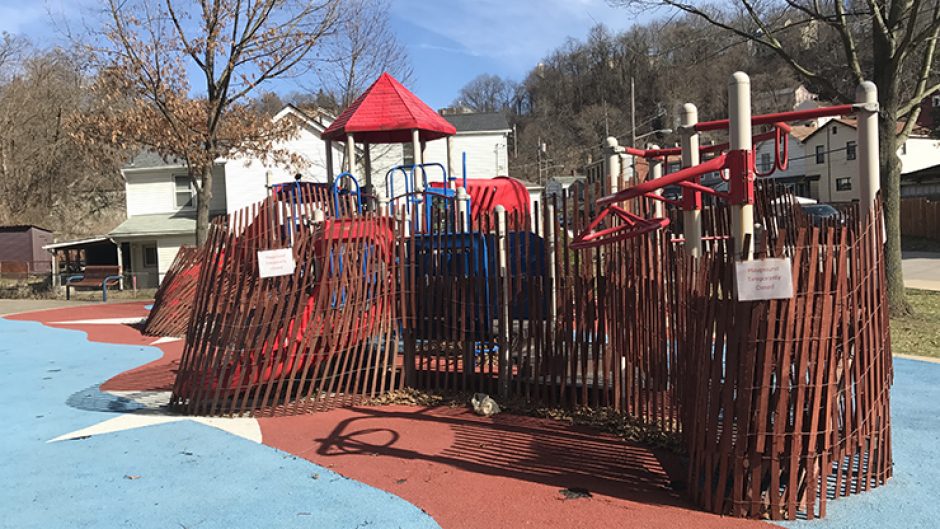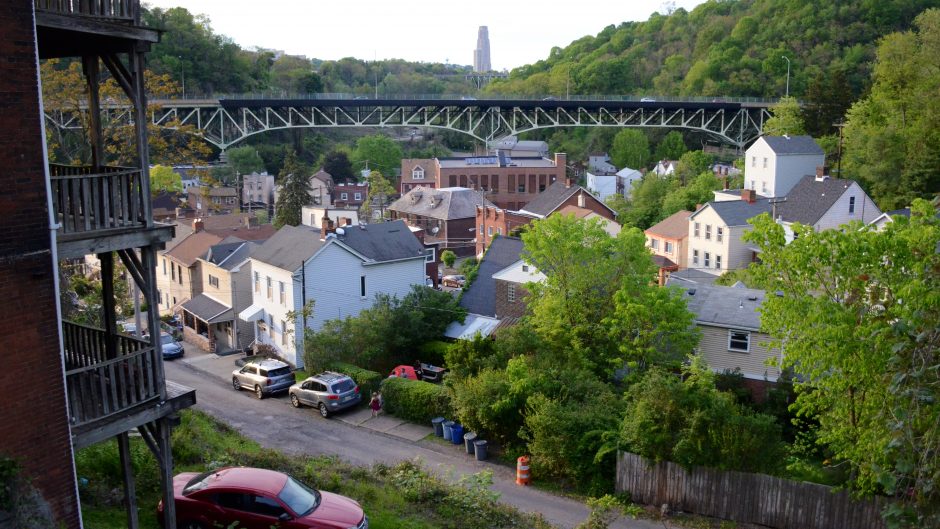On Sept. 2, Four Mile Run resident Barb Warwick found Department of Public Works [DPW] workers at the neighborhood’s playground. “[They were] replacing a lot of the old and rusted parts,” she recalled. “My kids are super happy to have their playground back.”
OnePGH will rehabilitate playgrounds in The Run and Hazelwood
For more than three years, neighbors in The Run had pleaded with city officials to repair and reopen their playground. It was plagued by hazards, including deep holes left by missing benches and tables. Concrete chunks had fallen from the Parkway East during PennDOT repairs, and a broken play structure had injured a child. But the sudden appearance of DPW workers was not quite what the community had asked for.
A Sept. 3 City of Pittsburgh press release announced that “Carnegie Mellon University [CMU] and the City of Pittsburgh have partnered to provide support for the rehabilitation of Four Mile Run playground in Greenfield and improvements at Lewis playground in Hazelwood as part of the OnePGH community investment plan announced earlier this year by Mayor William Peduto.”
The press release characterized DPW’s work on The Run’s existing playground as “short-term repairs” while the new playground is being planned. But residents of The Run say no one was lobbying for a brand-new playground, and that it should be unnecessary once their playground is fully repaired.
Plan does not include specifics or reflect neighborhood input
The press release did not say how much CMU planned to donate for each playground. OnePGH is a partnership between the city and outside nonprofits, including CMU. District 5 Councilman Corey O’Connor said there is “no set number” for the CMU donation “because we want to do a neighborhood process to see what people want at both playgrounds.”
“For The Run,” Councilman O’Connor added, “[these current repairs were] City money. We requested the repairs last fall, but there was a backlog due to COVID.”
“It’s exciting to see the work happen,” Run resident Ziggy Edwards said, but added, “We learned about these plans the same way we learned about the CMU- and Pitt-proposed Mon-Oakland Connector [MOC]: through press coverage. It’s disappointing that—once again—major decisions affecting our neighborhood came from a partnership between our elected representatives and monied interests that excluded residents.”
Hazelwood and Run residents, along with dozens of social justice and community groups, churches, and others have rejected the MOC—a proposed shuttle road between the Hazelwood Green development and Oakland campuses championed by the public-private partnership formed between CMU, Pitt, and Mayor Peduto’s administration for that purpose. Residents say building a new road through the Junction Hollow section of Schenley Park and The Run will permanently degrade the park and one day erase the neighborhood. Affected communities including The Run, Panther Hollow, Greenfield, South Oakland, and Hazelwood created their own plan for how MOC funds should be spent instead: Our Money, Our Solutions (OMOS).
The city did not seek input from Hazelwood residents on restoring Lewis Playground
James Cole of Hazelwood said he was unaware of CMU’s playground funding commitment until contacted for this article. “How is it that no one asked the people in the neighborhoods what they want?” he asked. “I have 150 kids up [at Burgwin Field for youth programs] every day, and this is the first I’m hearing about it.”
Three Rivers Village School [TRVS] is planning a move from the Spartan Center into the former YMCA across Chatsworth Avenue from Lewis Playground. Staffer Jason White-Weidow said he had not heard about the plan to improve the playground either.
“It would definitely be great for TRVS to have an updated park there and it would get a lot of use by our kids, including the Hazelwood residents,” Mr. White-Weidow said. “We agree though, that it is strange that the community wasn’t consulted.” He added that if other parks or community resource priorities would serve more residents, especially kids, then neighbors’ voices should be heard and respected.
Councilman O’Connor said the community has expressed itself extensively about both playgrounds. “We’ve heard from people for a number of years,” he said, naming the Greenfield Community Association, Hazelwood Initiative, Inc., Center of Life and other community groups. He said other feedback came from community and budget meetings and 311 calls.
Councilman O’Connor said there is no timeframe yet for the meetings the city wants to hold with residents, but stressed that “there will be opportunities for community input.”
Residents say Greenfield K-8 needs a playground
In a similar spirit to the OMOS plan, residents are already identifying and proposing alternatives for the Four Mile Run playground funds. Ms. Warwick says a playground is desperately needed at Greenfield Elementary School.
“Greenfield is a K-8 school with a special needs program and a Pre-K program. Right now, all they have is a field that’s often too muddy to use and a big parking lot,” Ms. Warwick explained. A group of parents from the Greenfield Community Association and the Greenfield School PTO are working together to raise funds for a playground. “We should build a playground that will improve the lives of kids from all over Greenfield,” she added.


Recent Comments